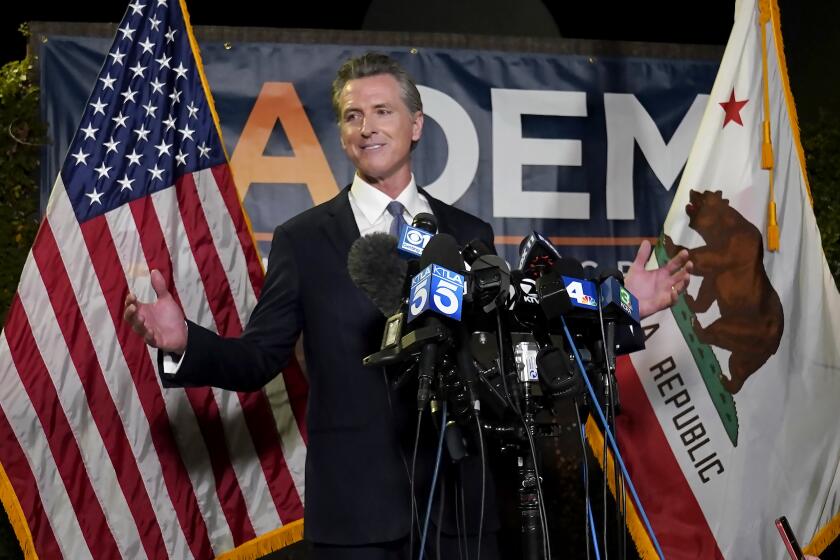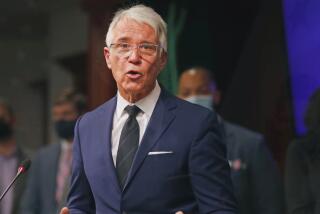After a $500,000 fine, he spent nearly four times as much trying to recall the local D.A.
- Share via
SANTA ROSA — In October 2017, as a deadly fire tore through the heart of Sonoma’s Wine Country, scores of elderly residents were forced to fend for themselves after being abandoned by staffers at two care homes.
More than 20 people would have died, investigators said, if family and police hadn’t come to the rescue and steered the old and infirm aboard city buses.
The horrifying episode prompted a state law boosting civil penalties for caregivers who abandon elderly or dependent adults in an emergency. The companies running the two homes agreed to pay $500,000 to settle a lawsuit brought by state and local prosecutors.
Then, not long after, the head of the companies, Bill Gallaher, launched a recall campaign against Sonoma County’s chief prosecutor, Dist. Atty. Jill Ravitch.
A wealthy and politically active developer, Gallaher spent nearly $1.8 million to drive Ravitch from office, carpet-bombing her with ads that attacked the district attorney on the airwaves, social media and through the mail. The campaign alleged all manner of corruption and malfeasance, targeting not just Ravitch but her political supporters as well.
The effort failed overwhelmingly: Voters last week rejected the recall, 78% to 22%.
Still, it’s another example of why California and local governments need to reform the recall process.
Committee seeking to recall L.A. County Dist. Atty. George Gascón says it won’t meet October petition deadline, but will try again later this year.
Ravitch called the campaign against her “a tantrum.”
“Sour grapes from an angry man who sought revenge because I did my job,” she said.
David McCuan, who teaches political science at Sonoma State University, called it “vendetta politics.”
“This wasn’t about trying to move an issue or idea,” McCuan said. “It was strictly gotcha.”
Gallaher could not be reached for comment.
But in a statement published in the Santa Rosa Press Democrat, recall proponents said they were “proud of the campaign we have run and the long-term impacts that this movement will have on ensuring accountability and transparency in Sonoma County politics, regardless of the recall’s outcome.”
The statement was unsigned, the irony apparently unintended.
Which leaves many questions. Among them: Why did Gallaher pursue the recall when Ravitch, the county district attorney since 2011, had already announced plans to retire when her third term ended next year? What changed Gallaher’s mind about Ravitch after he and his wife each contributed $2,750 to her 2014 campaign?
The election was held the same day Gov. Gavin Newsom faced voters. After all the sound and fury, the results of that recall effort nearly match the outcome of the November 2018 gubernatorial election. Newsom won that contest with 62% support. With ballots still being counted, the no-on-recall vote stands at 63%.
The cost of essentially re-running that election was $276 million. In Sonoma County, taxpayers may end up paying more than $900,000 for their recall vote.
It’s too easy in California to force a costly and wasteful special election like Tuesday’s vote.
Some might argue the process worked just fine. Ravitch was hauled before voters. The electorate delivered a resounding vote of support.
But tell that to the D.A., who’s still toweling off the mud blotting her reputation.
Ravitch lived with the threatened recall for nearly a year, battered by the barrage of negative advertising, which included attacks on her brother for a 2015 car wreck that killed his best friend. (Ads suggested Ravitch won him leniency through a sweetheart deal; the accident occurred in Napa County, outside her jurisdiction, and the CHP said neither drugs nor alcohol were a factor in the crash.)
“It broke my heart that my brother was pulled into it,” Ravitch said. “He had nothing to do with this.”
She spoke over lunch this week at a Santa Rosa restaurant, one of those casually upscale places, rebuilt after the original burned to the ground in the 2017 fire. Her manner was no-nonsense, the facts delivered as though she was presenting a legal brief, with the occasional profanity mixed in. Seated alongside her was Leo Buc, a strategist who helped beat the recall.
“I was never running against anybody. I was defending myself against an angry man telling lies,” Ravitch said. “That was what was so crazy about this and it was making me nuts. These guys” — she motioned at Buc — “had to keep talking me off the ledge” and persuade Ravitch to keep fighting the recall and not give up.
It all seems terribly unfair. But beyond the personal toll on one individual there is a larger concern about what just took place in the exquisite wine country.
McCuan spoke of “the gun behind the door,” or implicit threat that someone with a grudge and lots of money might strike fear in local officials — particularly in smaller communities — by threatening them with a recall. (For those worried about accountability, lawmakers already face voters on a regular basis.)
“The recall has been weaponized,” McCuan said, “and the danger is casting good people out of office. Or scaring them from running in the first place.”
After the fruitless Newsom recall attempt there are lots of reform ideas floating around.
One remedy would be upping the low signature threshold required to force a special election. (It took just about 30,000 signatures to force the recall in Sonoma County, which has more than 300,000 registered voters.)
Another would be ending the bounty for signature-gatherers, which gives a particular advantage to those with deep pockets; a ham sandwich could probably make the ballot if someone spent enough money on qualifying petitions.
Also, for the sake of fairness, targeted officials shouldn’t have to pay for their statement in the official voter guide. Ravitch spent nearly $8,000 of her own money to make the case against being removed.
Lunch was winding down. After all she’s been through, the 63-year-old Ravitch suggested, retirement now seems more appealing than ever. “I’ve been doing this business for almost 35 years and it’s very stressful,” she said, even without a recall election hanging over her head.
She rose from the table, donned her mask and started across the patio toward the exit.
As she passed by, a group of women spotted the D.A. and burst into applause.
More to Read
Get the latest from Mark Z. Barabak
Focusing on politics out West, from the Golden Gate to the U.S. Capitol.
You may occasionally receive promotional content from the Los Angeles Times.













